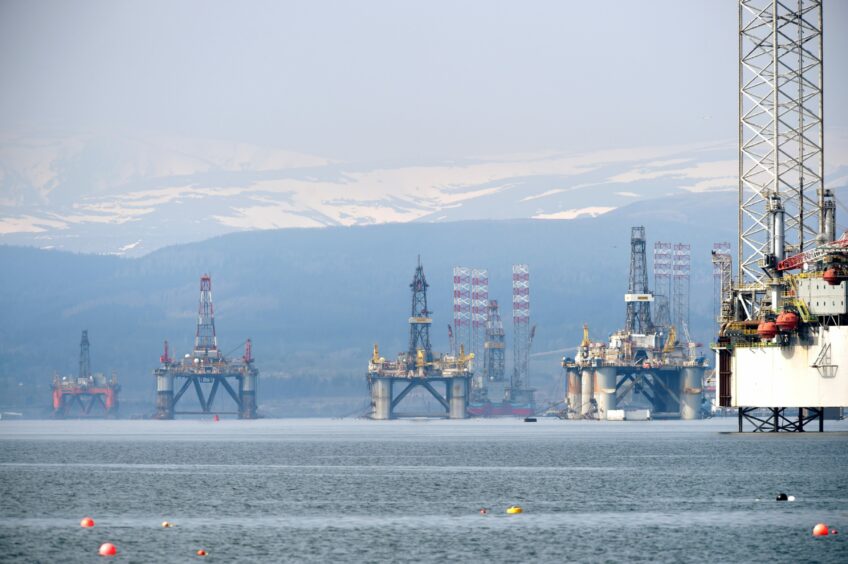Tax revenues from the UK North Sea rose by £7 billion to record levels last year as “windfall” levies and higher commodity prices saw receipts surge.
Annual Government Expenditure and Revenue Scotland (GERS) figures published today show revenues from offshore oil and gas activity reached £10.6bn in 2022-23, as war in Ukraine drove huge spikes in energy prices and a move to recoup profits from oil and gas firms.
North Sea oil and gas tax helping to cut Scotland’s notional trading deficit
Record energy sector revenue means Scotland’s notional deficit – some £19.1bn, equal to 9% of gross domestic product (GDP) – has continued to fall at a faster pace than that of the UK. Excluding oil and gas revenues would leave a deficit of 15.1% of GDP, or £28.5bn.
Business leaders said the latest GERS figures highlight the “critical” role of the energy sector to the economy. Government should prioritise more investment, rather than presuming against oil and gas, they added.
Total revenue across Scotland grew by 20.7%, or £15bn, over the period, compared with 11.3% for the UK as a whole – about half of which (£6.9bn) was from a rise in oil and gas revenue.
EPL impact
GERS calculations are estimates which apportion a share of North Sea revenue to Scotland based on the geographical location of oil and gas fields.
They show oil and gas revenues derived from four main sources: petroleum revenue tax, corporation tax, licence fees and the energy profits levy (EPL), or windfall tax – an additional 35% charge on UK oil and gas profits. EPL takes the combined rate of tax on sector profits to 75%.
According to the figures, the EPL added roughly £4.6bn to returns during the period.
The levy remains unpopular with industry and has been blamed for job cuts and companies slashing their investments.
North Sea production increased by 2% in 2022, to 78 million tonnes of oil equivalent.
Most of this was driven by increases in the production of gas, which rose by 16%, while oil output continued to decline, falling by 8%.
The impact of electricity and renewables on tax revenues is less clear. Scotland’s share of the electricity generator levy, worth around £200 million in 2022-23 and more in future years, is not yet captured in GERS.
The same goes for licence fees derived from the 2022 ScotWind round, which are yet to be published in the Crown Estate Scotland’s full-year accounts.
Holyrood minister attributes £1bn of Scotland’s overall deficit to UK Government ‘mismanagement’
Energy Secretary Neil Gray said: “While the record revenues from the North Sea show the extent that the UK continues to benefit from Scotland’s natural wealth, these statistics do not reflect the full benefits of the green economy, with hundreds of millions of pounds in revenue not yet captured.”
Mr Gray also claimed £1bn of the notional deficit is the direct result of the UK Government’s “mismanagement” of public finances.
“An independent Scotland would have the powers to make different choices, with different budgetary results, to best serve Scotland’s interests,” he added.
Business leaders said the figures showed the dangers of a hostile stance on North Sea oil and gas.
Aberdeen and Grampian Chamber of Commerce (AGCC) policy director Ryan Crighton said: “There remains a marked difference between what Scotland spends on public services and what it raises in taxes, to the tune of £19bn.
“AGCC has long called for a business environment which stimulates enterprise, allows companies to grow and reinvest, and ensures Scotland remains competitive in UK and global terms from a tax perspective.
Any other nation on earth would be incentivising reinvestment now to turbocharge our transition to net-zero.”
“What these figures reveal is that our energy sector is critical to any future economic success Scotland might hope to achieve.
“Any other nation on earth would be incentivising reinvestment now to turbocharge our transition to net-zero, and utilising the existing expertise that exists within our sector to achieve that, rather than adopting a presumption against oil and gas.”
Mike Tholen, sustainability and policy director at trade body Offshore Energies UK, also said the figures showed the sector’s “significant economic contribution” through taxation, as well as it supporting 90,000 jobs.
Mr Tholen added: “Our members are the driving force for the economy – supporting Scotland in ensuring security of energy supply, while helping to meet its net-zero ambitions.
“There is no simple choice between oil and gas on the one hand, and renewables on the other.”


